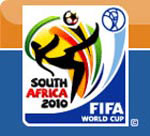
Subscribe & Follow
Advertise your job vacancies
Health experts rap world cup fast food sponsorship
It stars some of the fittest athletes on the planet but health experts say the 2010 FIFA World Cup's positive lifestyle message is undermined by the choice of junk food giants to sponsor the tournament.

The tie-ups with McDonald's, Coca-Cola and Budweiser are worth hundreds of millions of dollars to football's world governing body FIFA, and some of that cash is subsequently invested in grass-roots sports projects.
But nutritionists in host nation South Africa worry that youngsters are particularly vulnerable to the association of their sporting heroes to food and drinks which are high in fats and sugar.
A recent report by the national Heart Foundation found that 29% of South African men and 56% of women are overweight.
Even youngsters are not immune to weight problems with 17% of children aged between one and nine classed as overweight.
According to Thami Bolani, chairman of the National Consumer Forum, the tournament would have been the "perfect opportunity to educate all communities about healthy eating but we missed the boat on this one completely."
The World Cancer Research Fund, which says there is convincing evidence that excess body fat increases the risk of six types of cancer, said FIFA had been irresponsible in its choice of sponsors.
"It is disappointing that these companies have been chosen as sponsors and partners," said the charity's general manager Teresa Nightingale in reference to McDonald's, Coca-Cola and Budweiser.
"We have to be realistic and accept that the existing sponsorship agreements are now in place.
"But it would be a great boost for public health around the world if FIFA could show real leadership on this issue by announcing it will not consider companies that promote unhealthy products as sponsors or partners in future."
FIFA was not available for comment.
The sponsors' logos appear on the screen throughout the matches shown on South African television underneath the score as well as on pitchside advertising hoardings.
With many viewers too entranced by the football to bother to cook, fast food companies hope that the World Cup will signal a sales bonanza.
Britain's Men's Health magazine has predicted that a viewer will pile on the equivalent of 1,913 calories if they drink four cans of beer, eat three slices of pizza, half a bag of potato chips and half a pot of dip during a game.
But Don Thompson, the president of McDonald's, is a staunch defender of his company's links withh the World Cup and says that his firm offers a range of healthy food to customers.
"Food that McDonald's serve is the same thing people would get at a grocery store, we have salads, fruits, chicken and beef," said Thompson. "We serve a wide a variety of food."
A spokesman for Coca-Cola said it championed the message that "the key to a healthy, active lifestyle is a sensible, balanced diet and regular physical activity".
Johannesburg-based dietician Theresa Marias said the real problem was general ignorance.
"People should be well informed about their choices," she said.
Bolani also said that the government needed to counter a lack of knowledge about the impact of unhealthy eating.
"Maybe after the World Cup, the government will start with programmes of educating the public about the dangers of consuming high amounts of junk food and encourage parents to cook for their children," he said.
Source: Sapa-AFP
Source: I-Net Bridge

For more than two decades, I-Net Bridge has been one of South Africa’s preferred electronic providers of innovative solutions, data of the highest calibre, reliable platforms and excellent supporting systems. Our products include workstations, web applications and data feeds packaged with in-depth news and powerful analytical tools empowering clients to make meaningful decisions.
We pride ourselves on our wide variety of in-house skills, encompassing multiple platforms and applications. These skills enable us to not only function as a first class facility, but also design, implement and support all our client needs at a level that confirms I-Net Bridge a leader in its field.
Go to: http://www.inet.co.zaRelated
Controversy erupts over fast food branded desks in school 4 Mar 2025 3 questions to identify your brand’s strategic priorities for 2025 5 Dec 2024 Claremont office and retail market outshines Cape Town's top spots 9 Sep 2024 #Cannes2024: Creative Circle at Cannes - a vibrant return with a record attendance 18 Jun 2024 TBWA\South Africa collective shines at this year’s AdFocus Awards 24 Nov 2023 Israel: Why the brand boycotts probably won't make much difference 13 Nov 2023



